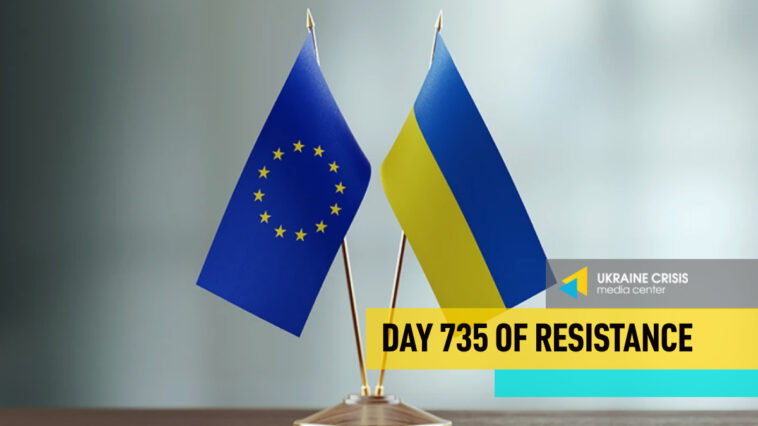“Good for entire world”: Zelenskyi comments on Macron’s idea of west sending troops to Ukraine. Self-proclaimed pro-Russian authorities of Transnistria ask Moscow for protection. Eighty-four per cent of Ukrainians assert support for joining the EU, a poll finds.
Eighty-four per cent of Ukrainians assert support for joining EU, poll finds
The vast majority of Ukrainians (84 per cent) back accession to the EU, a poll found. The survey was conducted by the sociological service of the Razumkov Center between January 19 and January 25. Support for Ukraine’s EU membership continues to rise. In December 2022, 79 per cent favored EU accession.
Only seven per cent of Ukrainians are against Ukraine’s accession to the EU, a decline from eight per cent in December 2022.
Some 91 per cent of Ukrainians in the west of the country favor EU accession, so do 86 per cent in the center, 78 per cent in the east, and 74.5 per cent in the south.
Younger Ukrainians are more likely than older adults to favor the path of EU accession. Eighty per cent of Ukrainians ages 60 and older and 89 per cent of Ukrainians ages 30 and younger favor EU accession.
Among those who speak Ukrainian at home, the preference for EU membership stood at 87 per cent. Among those who speak Russian at home, the preference for EU membership stood at 77 per cent.
Twenty-three per cent say that Ukraine will enter the EU in the next one-three years. Twenty-seven per cent say it will happen in the next three-five years, 15 per cent – in five-ten years, and five per cent – in the next 10-20 years, according to the poll.
Six per cent say that Ukraine will never be able to join the EU. Among those who do not support the country’s EU accession, 42 per cent say that Ukraine will never be able to join the EU. Among those who favor EU accession, only two per cent say so.
A majority of respondents have favorable views of the EU (87 per cent), NATO (77 per cent), the Council of Europe (67 per cent), the International Monetary Fund (62 per cent), the UN (57 per cent), and the International Committee of the Red Cross (54 per cent). About half of Ukrainians view the OSCE (48.5 per cent), and the IAEA (45.5 per cent) favorably. A majority of Ukrainians (65 per cent) have negative views of the Commonwealth of Independent States.
“Good for entire world”: Zelenskyi comments on Macron’s idea of west sending troops to Ukraine
Speaking at a news conference after a summit of southeastern European countries in Albania on Wednesday, Ukrainian President Volodymyr Zelenskyi commented on Macron’s idea of the west sending troops to Ukraine.
During his upcoming visit to Ukraine in mid-March, Macron will share “some new ideas” of how to strengthen Ukraine, Zelenskyi said.
“The stronger we will be in Ukraine, the weaker will be Putin. If any initiatives in Europe and in the world strengthen Ukraine, they are good for the entire world,” Zelenskyi said.
Self-proclaimed pro-Russian authorities of Transnistria ask Moscow for protection
The self-proclaimed pro-Russian authorities of Transnistria on Wednesday asked Moscow to implement measures to protect the region and its economy against an alleged threat from Moldova.
“There is social and economic pressure on Transnistria, which directly contradicts European principles and approaches to the protection of human rights and free trade,” read the text of a resolution from the meeting.
The self-proclaimed assembly of Transnistria also addressed the UN urging it “to stop violations by Moldova against the rights and freedoms of the citizens of Transnistria.” Possible provocations could lead to “escalating tensions,” it also said.
The address also mentions the OSCE, inter-parliamentary assembly of the CIS, and International Committee of the Red Cross.
On February 22, media reports began to circulate that the pro-Russian breakaway region of Transnistria may call for or organize a referendum on Transnistria’s annexation to Russia during a meeting on February 28.
“The Kremlin is conducting information operations against Moldova very similar to those that the Kremlin used before its invasions of Ukraine in 2014 and 2022,” the Institute for the Study of War warned in a report last week.
Moldova’s government dismissed the statement yesterday as “propaganda,” with a government spokesperson stating that the event was planned by “those on the left bank of the Dnister and the Kremlin” and that “at this point, we want say clearly and firmly – there are no dangers of escalation and destabilization of the situation in the Transnistrian region of Moldova.”
“We keep a close eye and reiterate that the Transnistrian region is aligned with the goal of peace and security of Moldova. This is another propaganda event,” spokesperson Daniel Voda said on Wednesday.
“The only tension today is the gloomy day outside,” he added.

